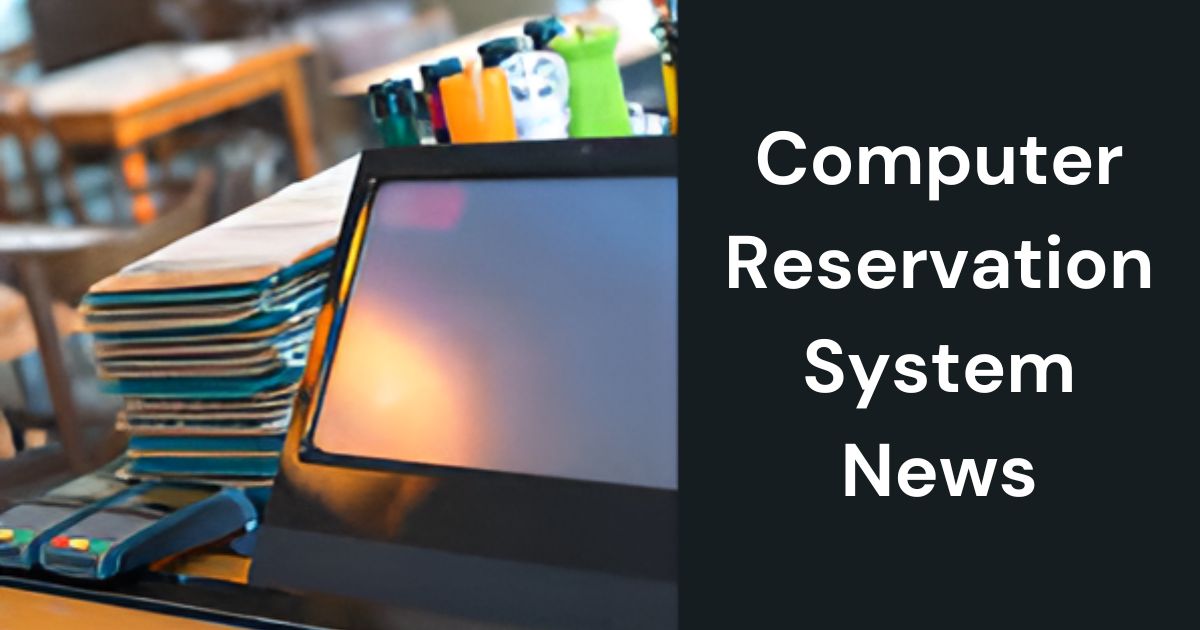The world of travel and hospitality has been revolutionized by technology, and at the forefront of this transformation are Computer Reservation Systems (CRS). These systems have become essential tools for airlines, hotels, travel agencies, and other sectors within the travel industry, streamlining the booking process and enhancing customer experience. Keeping abreast of the latest computer reservation system news is crucial for industry professionals and tech enthusiasts alike, as these developments often signal significant changes in how travel services are delivered and consumed.
In this article, we will delve into the intricacies of computer reservation system news, exploring their history, recent innovations, and the impact of these systems on various sectors of the travel industry. We will also examine the challenges facing CRS development, the role of big data, regulatory changes, and future prospects. By the end of this comprehensive guide, readers will have a thorough understanding of the current state and future trajectory of CRS technology.
What is a Computer Reservation System?
A computer reservation system news (CRSN) is a software application used by travel agencies, airlines, hotels, and other hospitality services to manage and facilitate bookings and reservations. These systems are designed to streamline the reservation process, allowing for real-time access to inventory, pricing, and availability information. CRSs are integral to the functioning of modern travel businesses, providing a centralized platform for managing customer bookings, payments, and itinerary changes.
The history of CRSs dates back to the 1960s when American Airlines developed the first automated booking system called SABRE (Semi-Automatic Business Research Environment). This innovation marked the beginning of a new era in travel technology, enabling airlines to manage reservations more efficiently and reduce the reliance on manual processes. Over the decades, CRSs have evolved significantly, incorporating advanced features such as dynamic pricing, real-time inventory updates, and integration with other travel-related systems.
Latest Trends in Computer Reservation Systems
The rapid advancement of technology has led to significant trends in computer reservation system news, making them more efficient, user-friendly, and capable of handling complex tasks. One of the most notable trends is the integration of Artificial Intelligence (AI) and Machine Learning (ML) into CRSs. These technologies enable systems to analyze vast amounts of data, predict customer preferences, and offer personalized recommendations, thereby enhancing the overall customer experience.
Another major trend is the shift towards cloud-based solutions. Traditional on-premise CRSs are being replaced by cloud-based systems that offer greater scalability, flexibility, and cost-effectiveness. Cloud-based CRSs allow travel businesses to access their systems from anywhere, at any time, and provide seamless updates without the need for extensive IT infrastructure.
Mobile accessibility and the development of dedicated mobile apps have also become crucial trends in computer reservation system news technology. With the increasing reliance on smartphones for travel planning and bookings, CRSs are being optimized for mobile devices. Mobile-friendly interfaces, intuitive navigation, and seamless integration with other mobile applications ensure that customers can easily book and manage their travel plans on the go.
Recent Innovations in CRS Technology
The field of computer reservation system news is constantly evolving, with new innovations being introduced regularly to enhance functionality and improve user experience. One such innovation is the development of automated booking processes. These processes utilize AI and ML algorithms to automate various aspects of the booking process, such as selecting the best available options, applying discounts, and even completing transactions. This not only saves time for customers but also reduces the workload for travel agents and service providers.
Real-time inventory management is another significant innovation in computer reservation system news technology. Traditional reservation systems often struggled with keeping inventory data up to date, leading to issues such as overbooking or underselling. Modern CRSs utilize real-time data synchronization, ensuring that inventory information is always accurate and up to date. This enables travel businesses to optimize their resources and provide customers with reliable availability information.
Enhanced user interfaces have also become a key focus area in computer reservation system news development. User-friendly interfaces with intuitive navigation, customizable dashboards, and advanced search functionalities make it easier for both customers and travel agents to use the system. These improvements not only enhance the user experience but also increase the efficiency of the reservation process.
Impact of CRS Updates on the Travel Industry
The continuous updates and enhancements in Computer Reservation Systems have had a profound impact on the travel industry, driving increased efficiency, accuracy, and customer satisfaction. One of the primary benefits of CRS updates is the improvement in operational efficiency. Automated processes and real-time data synchronization reduce the need for manual intervention, allowing travel businesses to handle a higher volume of bookings with greater accuracy and speed.
Enhanced customer experience is another significant impact of CRS updates. Personalized recommendations, seamless booking processes, and real-time inventory information contribute to a more satisfying and hassle-free customer journey. Customers can easily find and book their preferred travel options, manage their itineraries, and receive instant confirmations, leading to higher levels of satisfaction and loyalty.
Cost reductions and increased profitability are also notable outcomes of CRS updates. Automated processes and efficient resource management help travel businesses reduce operational costs, while dynamic pricing and inventory optimization enable them to maximize revenue. Additionally, the integration of CRS with other travel-related systems, such as customer relationship management (CRM) and revenue management systems (RMS), provides a holistic view of operations, facilitating better decision-making and strategic planning.
Top CRS Providers and Their Latest Offerings
Several leading companies dominate the CRS market, each offering unique solutions tailored to the needs of different segments within the travel industry. Amadeus, Sabre, and Travelport are among the top CRS providers, continually innovating and enhancing their offerings to stay ahead of the competition.
Amadeus
Amadeus is one of the most prominent CRS providers, known for its comprehensive suite of solutions catering to airlines, hotels, travel agencies, and other travel service providers. Their latest offerings include advanced AI-driven personalization tools, cloud-based platforms, and mobile-friendly interfaces. Amadeus has also invested in developing robust data analytics capabilities, allowing businesses to gain valuable insights into customer behavior and optimize their operations accordingly.
Sabre
Sabre has long been a leader in the computer reservation system news industry, providing cutting-edge solutions that empower travel businesses to streamline their operations and enhance customer experience. Sabre’s latest offerings focus on real-time data synchronization, dynamic pricing strategies, and seamless integration with other travel systems. Their cloud-based CRS platform provides scalability and flexibility, enabling businesses to adapt to changing market demands and stay competitive.
Travelport
Travelport is another major player in the CRS market, offering innovative solutions designed to meet the needs of modern travel businesses. Their latest offerings include advanced booking engines, mobile-friendly interfaces, and AI-driven recommendation systems. Travelport’s CRS platform also supports multi-modal travel, allowing customers to book flights, hotels, car rentals, and other services in a single transaction, providing a seamless and convenient booking experience.
How CRS Enhancements Are Transforming Airline Operations
Computer reservation system news have revolutionized airline operations, introducing efficiencies and capabilities that were previously unimaginable. One of the most significant transformations is the streamlining of check-in processes. With CRS integration, airlines can offer online check-in options, allowing passengers to select seats, print boarding passes, and manage their bookings from the comfort of their homes. This reduces congestion at airports and speeds up the boarding process, enhancing the overall travel experience.
Dynamic pricing strategies enabled by CRS updates have also transformed airline revenue management. Airlines can now analyze market demand, competitor pricing, and other factors in real-time to adjust ticket prices dynamically. This ensures optimal pricing, maximizes revenue, and allows airlines to offer competitive fares to attract more customers.
Loyalty program management has also been significantly enhanced by CRS advancements. Airlines can use CRSs to track customer preferences, purchase history, and travel patterns, allowing them to tailor loyalty programs to individual needs. Personalized offers, rewards, and promotions help build customer loyalty and increase repeat business, contributing to long-term profitability.
CRS in the Hotel Industry
The hotel industry has also greatly benefited from the advancements in Computer reservation system news, enabling hotels to manage bookings more efficiently and provide superior guest experiences. Centralized booking systems have become a cornerstone of modern hotel operations, allowing hotels to manage reservations, room availability, and pricing from a single platform. This centralization reduces the risk of overbooking, ensures accurate inventory management, and streamlines the reservation process.
Personalized guest experiences are another significant benefit of CRS in the hotel industry. Hotels can use CRS data to understand guest preferences, such as room type, amenities, and special requests. This information allows hotels to offer personalized services and tailor their offerings to individual guest needs, enhancing customer satisfaction and loyalty.
Revenue management tools integrated into CRSs enable hotels to optimize their pricing strategies and maximize revenue. By analyzing market trends, demand patterns, and competitor pricing, hotels can adjust their rates dynamically to ensure optimal occupancy and profitability. These tools also provide insights into booking trends and performance metrics, helping hotels make informed decisions and develop effective marketing strategies.
CRS News: Rail and Bus Transportation
The integration of Computer reservation system news into rail and bus transportation has brought significant improvements in ticketing and operational efficiency. CRSs have enabled the seamless integration of multiple modes of transport, allowing customers to book rail and bus tickets in conjunction with other travel services such as flights and hotels. This integration provides a convenient and comprehensive travel booking experience, saving time and effort for customers.
Simplified ticketing solutions are another major benefit of CRS in rail and bus transportation. CRSs offer online booking platforms that allow customers to purchase tickets, select seats, and receive digital tickets via email or mobile apps. This eliminates the need for physical tickets and reduces the risk of lost or stolen tickets, providing a more secure and efficient ticketing process.
Real-time seat availability is another significant advantage of CRS in rail and bus transportation. Customers can view and select available seats in real-time, ensuring that they can secure their preferred seating options. This real-time information also helps transportation providers optimize their resources, manage capacity, and reduce the likelihood of overbooking or underselling.
Challenges Facing CRS Development
Despite the numerous advancements and benefits of Computer Reservation Systems, there are several challenges that developers and travel businesses face in implementing and maintaining these systems. One of the primary challenges is data security and privacy concerns. CRSs handle a vast amount of sensitive customer data, including personal information, payment details, and travel itineraries. Ensuring the security and privacy of this data is critical to prevent breaches and protect customer trust.
Integration with legacy systems is another significant challenge in CRS development. Many travel businesses still rely on outdated systems that may not be compatible with modern CRS technology. Integrating new CRSs with these legacy systems can be complex and time-consuming, requiring significant resources and expertise to ensure a seamless transition.
Handling high volume transactions is also a critical challenge for CRSs, particularly during peak travel periods. CRSs must be capable of processing large volumes of bookings, payments, and inventory updates in real-time without compromising performance or accuracy. Ensuring scalability and reliability under high demand is essential to prevent system crashes and ensure a smooth booking experience for customers.
Also Read: Alaya AI
Case Studies: Successful CRS Implementations
Airline Success Stories
Several airlines have successfully implemented advanced Computer Reservation Systems, resulting in significant operational improvements and customer satisfaction. For instance, a leading international airline implemented a cloud-based CRS with dynamic pricing and real-time inventory management. This allowed the airline to optimize its pricing strategies, reduce operational costs, and enhance the booking experience for customers. As a result, the airline saw a substantial increase in revenue and customer loyalty.
Hotel Chains Benefiting from CRS
A major hotel chain integrated a state-of-the-art CRS with personalized guest experience features and revenue management tools. The CRS allowed the hotel to centralize its booking system, accurately manage room availability, and offer personalized services to guests. The hotel chain also utilized the CRS to analyze market trends and adjust pricing dynamically, leading to higher occupancy rates and increased revenue. The implementation of the CRS significantly improved operational efficiency and customer satisfaction.
Multi-Modal Transport Systems
A regional transportation authority successfully implemented a multi-modal CRS that integrated rail, bus, and other transportation services. The CRS provided a seamless booking experience, allowing customers to plan and book their entire journey through a single platform. The system also offered real-time seat availability and simplified ticketing solutions, enhancing convenience for passengers. The implementation of the CRS resulted in increased ridership, improved resource management, and higher customer satisfaction.
The Role of Big Data in CRS
Big data plays a crucial role in the advancement of Computer reservation system news, providing valuable insights that drive better decision-making and enhance customer experiences. Predictive analytics powered by big data allows CRSs to forecast demand patterns, optimize inventory management, and adjust pricing strategies dynamically. By analyzing historical data and market trends, CRSs can predict customer preferences and offer personalized recommendations, leading to higher conversion rates and customer satisfaction.
Customer behavior insights derived from big data enable travel businesses to understand their customers better and tailor their offerings accordingly. CRSs can track customer interactions, preferences, and purchase history to build detailed customer profiles. This information allows businesses to provide personalized services, targeted promotions, and customized travel experiences, enhancing customer loyalty and retention.
Inventory forecasting is another critical application of big data in CRS. By analyzing booking trends, seasonal patterns, and external factors such as events and holidays, CRSs can accurately forecast demand and optimize inventory levels. This ensures that travel businesses can meet customer demand without overstocking or underselling, leading to higher efficiency and profitability.
Regulatory Changes and Their Impact on CRS
Regulatory changes in the travel industry can have a significant impact on the development and operation of Computer Reservation Systems. Compliance with data protection laws is one of the primary concerns for CRSs, particularly with the introduction of regulations such as the General Data Protection Regulation (GDPR) in Europe. CRSs must ensure that they handle customer data in accordance with these regulations, implementing robust security measures and obtaining necessary consents to protect customer privacy.
Industry standards and certifications also play a crucial role in shaping CRS development. Compliance with standards such as the Payment Card Industry Data Security Standard (PCI DSS) is essential for ensuring the security of payment transactions processed through CRSs. Adhering to these standards not only protects customer data but also enhances the reputation and credibility of travel businesses.
International regulations can also impact CRS operations, particularly for businesses operating in multiple countries. Compliance with regulations related to data transfer, storage, and processing across borders is essential to ensure seamless and legal operation. CRSs must be capable of adapting to varying regulatory requirements and implementing necessary measures to ensure compliance.
Future Prospects of Computer Reservation Systems
The future of Computer Reservation Systems looks promising, with several emerging technologies and market trends set to shape the industry. One of the most exciting prospects is the continued integration of Artificial Intelligence and Machine Learning into CRSs. These technologies will enable even more advanced personalization, predictive analytics, and automation, further enhancing the efficiency and customer experience of CRSs.
The potential market growth for CRS technology is significant, driven by the increasing demand for seamless and efficient travel booking solutions. As more travel businesses adopt CRS technology, the market is expected to expand, offering new opportunities for innovation and development. Emerging markets in Asia, Africa, and Latin America also present significant growth potential for CRS providers, as travel demand in these regions continues to rise.
Industry experts predict that the future of CRSs will be characterized by greater integration and interoperability. The development of open APIs and standardized protocols will enable seamless integration between CRSs and other travel-related systems, such as customer relationship management (CRM) and revenue management systems (RMS). This will provide a more holistic view of operations and facilitate better decision-making and strategic planning.
How CRS Updates Enhance Travel Agency Operations
Travel agencies have also benefited significantly from the updates and advancements in Computer Reservation Systems. Efficient booking management is one of the primary advantages, as CRSs allow travel agents to manage bookings, payments, and itinerary changes seamlessly. Automated processes and real-time data synchronization reduce the need for manual intervention, allowing travel agents to focus on providing personalized services and enhancing customer experience.
Commission tracking is another crucial feature of modern CRSs, enabling travel agencies to monitor and manage commissions from various suppliers accurately. CRSs provide detailed reports and analytics on commission earnings, helping travel agencies optimize their revenue streams and identify opportunities for growth.
Customer Relationship Management (CRM) functionalities integrated into CRSs enable travel agencies to build and maintain strong relationships with their customers. CRSs can track customer interactions, preferences, and purchase history, allowing travel agents to offer personalized recommendations and services. This not only enhances customer satisfaction but also increases loyalty and repeat business, contributing to long-term profitability.
CRS News: Key Industry Conferences and Events
Staying updated with the latest developments in Computer Reservation Systems is crucial for industry professionals, and key industry conferences and events provide valuable opportunities for networking, learning, and sharing insights. Recent CRS conferences have highlighted significant advancements and trends in the industry, offering a platform for experts and innovators to showcase their latest solutions and technologies.
Upcoming events to watch include the annual CRS Summit, where industry leaders and professionals gather to discuss the future of CRS technology and share best practices. The summit features keynote speeches, panel discussions, and hands-on workshops, providing attendees with valuable insights into the latest trends and innovations in CRS.
Other notable events include the Travel Technology Europe (TTE) conference, which focuses on the latest technological advancements in the travel industry, including CRS. The event brings together technology providers, travel businesses, and industry experts to explore new solutions and strategies for enhancing travel operations and customer experience.
Expert Opinions on CRS Developments
Expert opinions play a crucial role in shaping the future of Computer reservation system news, providing valuable insights and predictions on emerging trends and technologies. Interviews with industry leaders reveal a strong emphasis on the integration of AI and ML into CRSs, with experts predicting that these technologies will revolutionize the way travel bookings are managed and personalized.
Technology experts also highlight the importance of data security and privacy in CRS development. Ensuring the protection of customer data and compliance with regulatory requirements is essential for maintaining trust and credibility in the industry. Experts advocate for the implementation of robust security measures and continuous monitoring to prevent data breaches and protect customer information.
Predictions and insights from industry experts indicate that the future of CRSs will be characterized by greater automation, personalization, and integration. The development of more advanced algorithms and data analytics capabilities will enable CRSs to offer highly personalized recommendations and services, enhancing the overall customer experience. Additionally, the integration of CRSs with other travel-related systems will provide a more comprehensive view of operations, facilitating better decision-making and strategic planning.
Impact of CRS on Small and Medium Enterprises
Small and medium enterprises (SMEs) in the travel industry have also benefited from the advancements in Computer Reservation Systems. Affordable solutions tailored to the needs of SMEs provide them with the tools and capabilities to compete with larger players in the market. Cloud-based CRSs, in particular, offer cost-effective options that do not require extensive IT infrastructure, making them accessible to smaller businesses.
Success stories and testimonials from SMEs highlight the positive impact of CRS on their operations. For instance, a small travel agency implemented a cloud-based CRS with automated booking and commission tracking features. This allowed the agency to streamline its operations, reduce costs, and provide better service to its customers. The implementation of the CRS led to increased bookings, higher customer satisfaction, and improved profitability.
CRS technology also enables SMEs to offer personalized services and build strong relationships with their customers. By leveraging the data and insights provided by CRSs, SMEs can tailor their offerings to individual customer preferences, providing a more personalized and satisfying travel experience. This not only enhances customer loyalty but also helps SMEs differentiate themselves in a competitive market.
How to Stay Informed About CRS News
Staying informed about the latest developments in Computer Reservation Systems is crucial for industry professionals and enthusiasts. There are several recommended industry publications that provide valuable insights and updates on CRS technology, including articles, reports, and expert opinions. Subscribing to these publications ensures that readers receive the latest news and trends directly in their inbox.
Online resources and forums also offer a wealth of information on CRS developments. Websites such as Travel Weekly, Skift, and PhocusWire provide comprehensive coverage of the travel industry, including CRS news and updates. Online forums and communities, such as FlyerTalk and TripAdvisor, offer platforms for industry professionals and travelers to share experiences, discuss trends, and exchange insights on CRS technology.
Subscribing to newsletters from leading CRS providers and industry associations is another effective way to stay informed. These newsletters often include updates on the latest product offerings, industry trends, and upcoming events, providing valuable information directly from the source.
Conclusion
In conclusion, Computer reservation system news have revolutionized the travel industry, offering advanced solutions that enhance operational efficiency, customer experience, and profitability. The continuous advancements in CRS technology, driven by trends such as AI integration, cloud-based solutions, and mobile accessibility, have transformed the way travel bookings are managed and delivered. Staying informed about the latest computer reservation system news is essential for industry professionals, enabling them to leverage these advancements and stay competitive in a rapidly evolving market.









